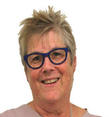TinkerToys vs Tonka Trucks: Creating a Parent - led Support Group Model Responsive to Participant Needs (USC CA UCEDD)
December 22, 2014

|
Fran Goldfarb, MA, MCHES, Director of Family Support at the USC UCEDD at Children's Hospital Los Angeles, has worked on a First 5 LA grant with Children's Institute, Inc. (CII) to develop 100 support groups for parents of children 0-5 across Los Angeles County. The overall goal of the program is to develop opportunities for underserved, at-risk parents that foster social connections, reduce isolation, and encourage sharing of knowledge and skills. The groups were developed in collaboration with 5 Community Based Organizations (Weingart East LA YMCA, Para Los Niños, Family Focus Family Resource and Empowerment Center, For the Child and Parents' Place Family Resource and Empowerment Center). This project, Parent Support Circles of Los Angeles County (PSCLAC), required the development of support group curricula on topics identified through a needs assessment consisting of parent focus groups and key informant interviews. The needs assessment was conducted by trained community parents. CII proposed peer-led support groups facilitated by parents with lived experience who would receive training and ongoing supervision.
The needs assessment strongly endorsed several values: flexibility, group decision-making and community-connected facilitators. It also identified nine types of groups: Nurturing Babies, Nurturing Toddlers, Nurturing Preschoolers, Preparing for School, Special Needs, Self-Care, Behavior Challenges, Young Parents, Young Children and Men Nurturing Children. Using the values identified in the needs assessment, CII developed the TinkerToy responsive support group model, which provides support group facilitators with flexible components they can use to develop support groups that are responsive to participant needs and values.
The TinkerToy model distinguishes itself in several areas. It recognizes that the type of group, while influencing participant recruitment, doesn't dictate what the groups will actually discuss. What is discussed in the group is dependent on both group and individual needs. Given that these are support groups rather than classes, a rigid curriculum wasn't a good match. However , given that they are all community parents and most did not have previous support group facilitation experience , the facilitators do need supports, that ensure their feelings of confidence and competence, . Therefore the TinkerToy model provides tools including a 3-day training, Topic Guides with resources and ongoing reflective supervision.
The TinkerToy responsive support group model can be replicated in other areas around the country. Training materials are available upon request.
Contact Information:
Fran Goldfarb, MA, MCHES
Director of Family Support at the USC UCEDD at Children's Hospital Los Angeles
323-361-3831
[email protected]







